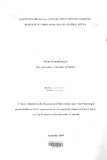Participatory evaluation of sweet potato varieties response to virus infection in central Kenya
Abstract
Sweet potato is an important food and cash crop grown by small holder farmers but its
productivity is limited by sweet potato virus disease (SPVD). Farmers' lack of disease
free vines and inadequate knowledge on identification and management of the disease
perpetuates the problem. Genotype based tolerance to the disease has been identified
and it is a cheap and sustainable solution for increased productivity. The overall
objective of this study was to evaluate and disseminate sweet potato varieties tolerant to
SPVD and with farmer and market preferred traits. A structured questionare was used to
obtain information on production constraints at Kibirigwi, Kirinyaga from small holder
commercial sweet potato farmers. Technologies for maintaining nurseries free from
virus vectors were assessed. Additionally, response of sweet potato varieties to SPVD
was assessed on-station and on farmers' fields between May 2006 and March 2007.
Viruses infecting sweet potato were evaluated using nitro cellulose membrane enzyme
linked immunosorbent assay. Rouging and insect proof net and plastic cover maintained
the vines apparently clean. Insect proof net costed three times more than polythene but
minimal costs were incurred through rouging. Farmers in Kibirigwi were not aware of
SPVD and used infected material to establish the crop. Marketability, high yield and
early maturity were the most important criteria farmers used to score varieties. The
marketability traits were skin colour, high sugar and dry matter content, fibrelessness,
tuber shape and size. Susceptible varieties were infected by more than two viruses and
had lower yield compaired to tolerant varieties. Farmer participation in problem
identification and management of diseases provided a forum for training, identification,
multiplication and dissemination of varieties tolerant to SPVD.
Citation
Master of Science degree in Crop ProtectionPublisher
University of Nairobi Department of Plant Science and Crop Protection

